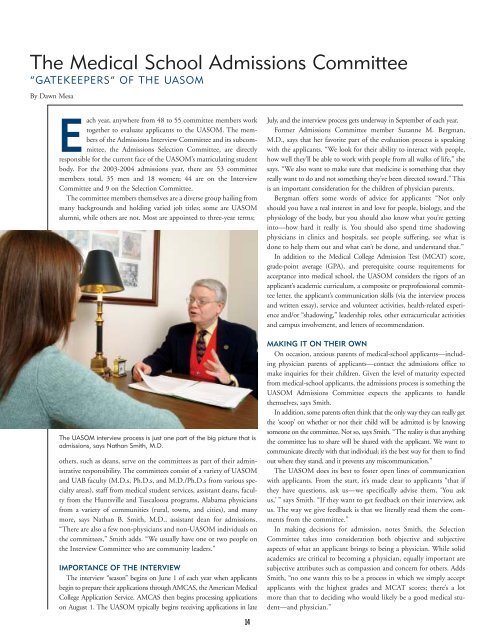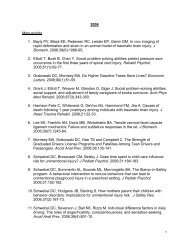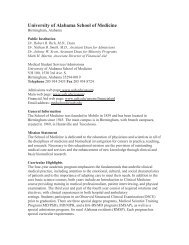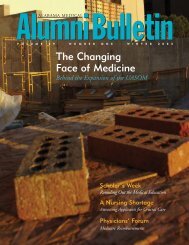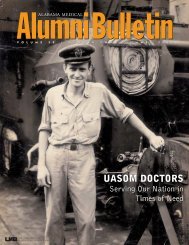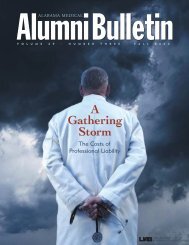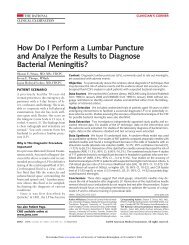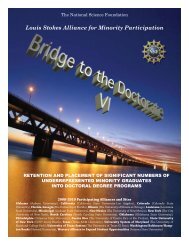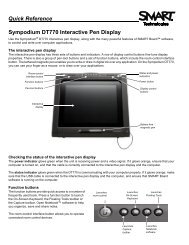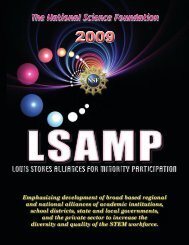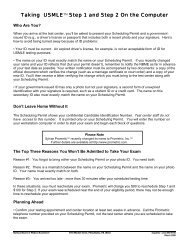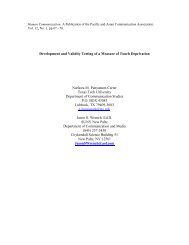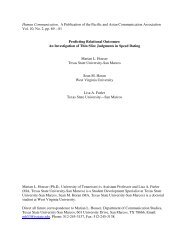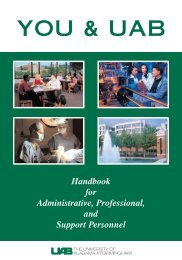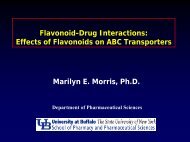the pursuit of parkinson's - The University of Alabama at Birmingham
the pursuit of parkinson's - The University of Alabama at Birmingham
the pursuit of parkinson's - The University of Alabama at Birmingham
You also want an ePaper? Increase the reach of your titles
YUMPU automatically turns print PDFs into web optimized ePapers that Google loves.
<strong>The</strong> Medical School Admissions Committee<br />
“GATEKEEPERS” OF THE UASOM<br />
By Dawn Mesa<br />
Each year, anywhere from 48 to 55 committee members work<br />
toge<strong>the</strong>r to evalu<strong>at</strong>e applicants to <strong>the</strong> UASOM. <strong>The</strong> members<br />
<strong>of</strong> <strong>the</strong> Admissions Interview Committee and its subcommittee,<br />
<strong>the</strong> Admissions Selection Committee, are directly<br />
responsible for <strong>the</strong> current face <strong>of</strong> <strong>the</strong> UASOM’s m<strong>at</strong>ricul<strong>at</strong>ing student<br />
body. For <strong>the</strong> 2003-2004 admissions year, <strong>the</strong>re are 53 committee<br />
members total, 35 men and 18 women; 44 are on <strong>the</strong> Interview<br />
Committee and 9 on <strong>the</strong> Selection Committee.<br />
<strong>The</strong> committee members <strong>the</strong>mselves are a diverse group hailing from<br />
many backgrounds and holding varied job titles; some are UASOM<br />
alumni, while o<strong>the</strong>rs are not. Most are appointed to three-year terms;<br />
<strong>The</strong> UASOM interview process is just one part <strong>of</strong> <strong>the</strong> big picture th<strong>at</strong> is<br />
admissions, says N<strong>at</strong>han Smith, M.D.<br />
o<strong>the</strong>rs, such as deans, serve on <strong>the</strong> committees as part <strong>of</strong> <strong>the</strong>ir administr<strong>at</strong>ive<br />
responsibility. <strong>The</strong> committees consist <strong>of</strong> a variety <strong>of</strong> UASOM<br />
and UAB faculty (M.D.s, Ph.D.s, and M.D./Ph.D.s from various specialty<br />
areas), staff from medical student services, assistant deans, faculty<br />
from <strong>the</strong> Huntsville and Tuscaloosa programs, <strong>Alabama</strong> physicians<br />
from a variety <strong>of</strong> communities (rural, towns, and cities), and many<br />
more, says N<strong>at</strong>han B. Smith, M.D., assistant dean for admissions.<br />
“<strong>The</strong>re are also a few non-physicians and non-UASOM individuals on<br />
<strong>the</strong> committees,” Smith adds. “We usually have one or two people on<br />
<strong>the</strong> Interview Committee who are community leaders.”<br />
IMPORTANCE OF THE INTERVIEW<br />
<strong>The</strong> interview “season” begins on June 1 <strong>of</strong> each year when applicants<br />
begin to prepare <strong>the</strong>ir applic<strong>at</strong>ions through AMCAS, <strong>the</strong> American Medical<br />
College Applic<strong>at</strong>ion Service. AMCAS <strong>the</strong>n begins processing applic<strong>at</strong>ions<br />
on August 1. <strong>The</strong> UASOM typically begins receiving applic<strong>at</strong>ions in l<strong>at</strong>e<br />
July, and <strong>the</strong> interview process gets underway in September <strong>of</strong> each year.<br />
Former Admissions Committee member Suzanne M. Bergman,<br />
M.D., says th<strong>at</strong> her favorite part <strong>of</strong> <strong>the</strong> evalu<strong>at</strong>ion process is speaking<br />
with <strong>the</strong> applicants. “We look for <strong>the</strong>ir ability to interact with people,<br />
how well <strong>the</strong>y’ll be able to work with people from all walks <strong>of</strong> life,” she<br />
says. “We also want to make sure th<strong>at</strong> medicine is something th<strong>at</strong> <strong>the</strong>y<br />
really want to do and not something <strong>the</strong>y’ve been directed toward.” This<br />
is an important consider<strong>at</strong>ion for <strong>the</strong> children <strong>of</strong> physician parents.<br />
Bergman <strong>of</strong>fers some words <strong>of</strong> advice for applicants: “Not only<br />
should you have a real interest in and love for people, biology, and <strong>the</strong><br />
physiology <strong>of</strong> <strong>the</strong> body, but you should also know wh<strong>at</strong> you’re getting<br />
into—how hard it really is. You should also spend time shadowing<br />
physicians in clinics and hospitals, see people suffering, see wh<strong>at</strong> is<br />
done to help <strong>the</strong>m out and wh<strong>at</strong> can’t be done, and understand th<strong>at</strong>.”<br />
In addition to <strong>the</strong> Medical College Admission Test (MCAT) score,<br />
grade-point average (GPA), and prerequisite course requirements for<br />
acceptance into medical school, <strong>the</strong> UASOM considers <strong>the</strong> rigors <strong>of</strong> an<br />
applicant’s academic curriculum, a composite or prepr<strong>of</strong>essional committee<br />
letter, <strong>the</strong> applicant’s communic<strong>at</strong>ion skills (via <strong>the</strong> interview process<br />
and written essay), service and volunteer activities, health-rel<strong>at</strong>ed experience<br />
and/or “shadowing,” leadership roles, o<strong>the</strong>r extracurricular activities<br />
and campus involvement, and letters <strong>of</strong> recommend<strong>at</strong>ion.<br />
MAKING IT ON THEIR OWN<br />
On occasion, anxious parents <strong>of</strong> medical-school applicants—including<br />
physician parents <strong>of</strong> applicants—contact <strong>the</strong> admissions <strong>of</strong>fice to<br />
make inquiries for <strong>the</strong>ir children. Given <strong>the</strong> level <strong>of</strong> m<strong>at</strong>urity expected<br />
from medical-school applicants, <strong>the</strong> admissions process is something <strong>the</strong><br />
UASOM Admissions Committee expects <strong>the</strong> applicants to handle<br />
<strong>the</strong>mselves, says Smith.<br />
In addition, some parents <strong>of</strong>ten think th<strong>at</strong> <strong>the</strong> only way <strong>the</strong>y can really get<br />
<strong>the</strong> ‘scoop’ on whe<strong>the</strong>r or not <strong>the</strong>ir child will be admitted is by knowing<br />
someone on <strong>the</strong> committee. Not so, says Smith. “<strong>The</strong> reality is th<strong>at</strong> anything<br />
<strong>the</strong> committee has to share will be shared with <strong>the</strong> applicant. We want to<br />
communic<strong>at</strong>e directly with th<strong>at</strong> individual; it’s <strong>the</strong> best way for <strong>the</strong>m to find<br />
out where <strong>the</strong>y stand, and it prevents any miscommunic<strong>at</strong>ion.”<br />
<strong>The</strong> UASOM does its best to foster open lines <strong>of</strong> communic<strong>at</strong>ion<br />
with applicants. From <strong>the</strong> start, it’s made clear to applicants “th<strong>at</strong> if<br />
<strong>the</strong>y have questions, ask us—we specifically advise <strong>the</strong>m, ‘You ask<br />
us,’ ” says Smith. “If <strong>the</strong>y want to get feedback on <strong>the</strong>ir interview, ask<br />
us. <strong>The</strong> way we give feedback is th<strong>at</strong> we literally read <strong>the</strong>m <strong>the</strong> comments<br />
from <strong>the</strong> committee.”<br />
In making decisions for admission, notes Smith, <strong>the</strong> Selection<br />
Committee takes into consider<strong>at</strong>ion both objective and subjective<br />
aspects <strong>of</strong> wh<strong>at</strong> an applicant brings to being a physician. While solid<br />
academics are critical to becoming a physician, equally important are<br />
subjective <strong>at</strong>tributes such as compassion and concern for o<strong>the</strong>rs. Adds<br />
Smith, “no one wants this to be a process in which we simply accept<br />
applicants with <strong>the</strong> highest grades and MCAT scores; <strong>the</strong>re’s a lot<br />
more than th<strong>at</strong> to deciding who would likely be a good medical student—and<br />
physician.”<br />
14


